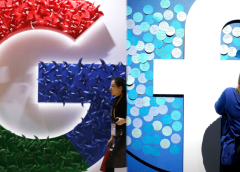
Make Big Tech play fair
[ad_1]
Who do you trust more: your local newspaper or Google content moderators in California?
If you trust people living in your community more than out-of-touch, woke engineers living in Silicon Valley, then you should support the Journalism Competition and Preservation Act, which will be voted on by the Senate Judiciary Committee next month.
Google is one of the most powerful businesses on Earth. It controls what news you see and when you see it. It did not become this powerful by playing fair.
When Google bought an online advertising company called DoubleClick in 2007, it already had a monopoly in search, but it hadn’t until then figured out how to turn that monopoly into profits. By inserting itself as a middleman between online advertisers and publishers, however, Google was able to leverage its search monopoly into an online advertising monopoly as well.
Today, Google and Facebook capture about 60% of all online advertising revenue. For every dollar spent, they keep about half. This means that when Dave’s Donuts spends $1,000 to advertise in the online version of the Dayton Daily News, Google gets $500 and the paper gets $500.
Google creates none of the local news you consume, but it gets half the revenue. This is one reason why so many local papers have died. It is also why, although traffic to news sites is up 40% since 2014, revenue for news sites is down 58%.
A bipartisan coalition from across the ideological spectrum, including Sens. Rand Paul (R-KY), John Kennedy (R-LA), Amy Klobuchar (D-MN), and Cory Booker (D-NJ), as well as Reps. Ken Buck (R-CO), Burgess Owens (R-UT), David Cicilline (D-RI), and Hakeem Jeffries (D-NY), has come together with legislation that will help neutralize Google’s online advertising monopoly and force the company to play fair.
The Journalism Competition and Preservation Act would create a temporary antitrust safe harbor for small publishers, including the Washington Examiner, to work together and negotiate a fair advertising deal with Google and Facebook. This sort of arrangement has already been put in place elsewhere (for example, in Australia). Large publications with more than 1,500 employees, such as the New York Times and the Washington Post, would not be given this exemption.
Google and Facebook spend no money creating the news content that users see on their sites. They completely depend on content creators for their revenue. If news creators were allowed to cooperate and demand higher prices for the news they produce, Google and Facebook would have to pay for what they get.
Such an antitrust safe harbor already exists in the music industry. Musicians are allowed to negotiate together with radio stations and entertainment venues for flat rates that ensure they are reasonably compensated for their work and creativity. News creators need and should have a similar exemption.
Some lawmakers say the legislation would create a news cartel as bad as Google’s monopoly. But the legislation specifically sets aside some of the money from any agreement signed with Big Tech companies for small and new news creators. Publishers are also forbidden from excluding anyone from the negotiations for ideological reasons.
Conservatives should be especially concerned about the power Google has amassed over the news industry. In 2020, Google and its employees gave 94% of their political donations to Democratic candidates. This is not a company conservatives should trust with control over what news people can see. Why Republicans such as House Minority Leader Kevin McCarthy want to protect Google’s monopoly power by opposing this legislation is perhaps a mystery. Or maybe it has something to do with the fact that his district is in California.
News creators, including the Washington Examinerwould get more money from the reformed arrangement the bill would put in place. Google would get somewhat less than they do now, but it would acquire a better business relationship based on mutual advantage rather than lopsided predation.
The Journalism Competition and Preservation Act would put news content creators on a level playing field with Big Tech. For the first time in decades, Big Tech would have to play fair.
[ad_2]
Source link


